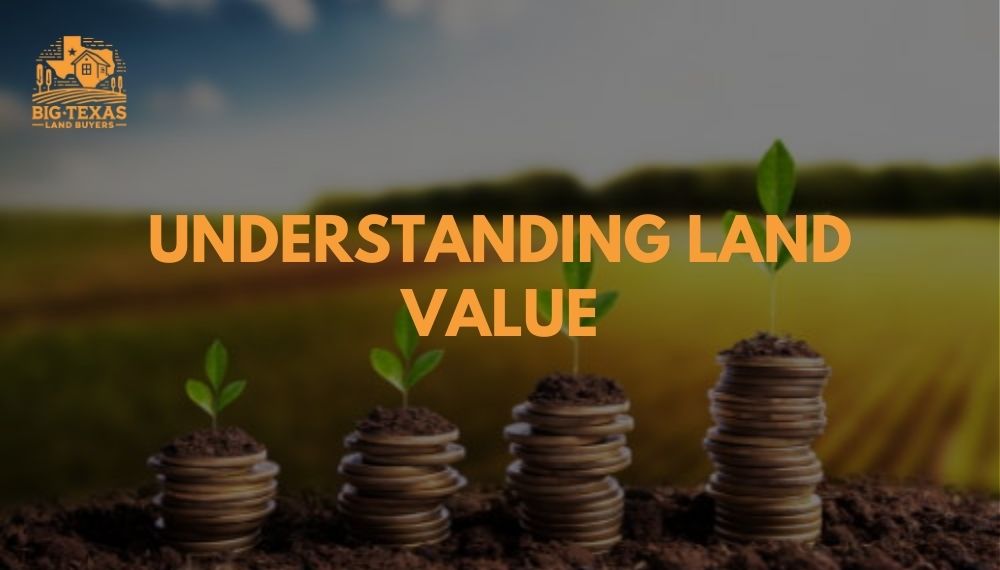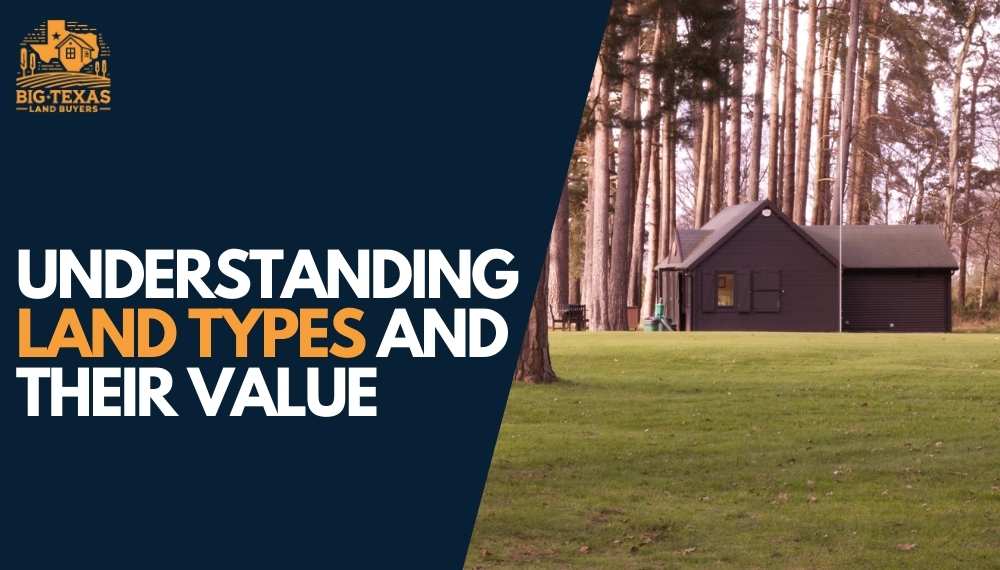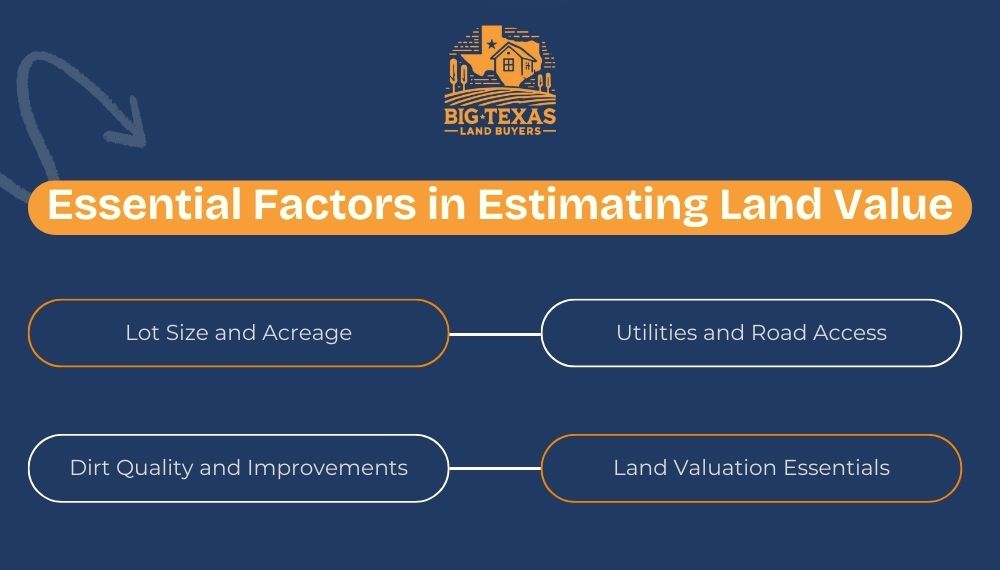“How much is my land worth” is a critical question for both landowners and potential buyers. Whether you intend to sell your land or invest in a new property, understanding land value is critical to getting a fair bargain. The value of your land is determined by a variety of factors, including its size, location, and the impact of local zoning rules.
It is critical to understand that land price estimates might fluctuate due to changes in market supply and demand, as well as regional infrastructural projects. Furthermore, you must be familiar with local zoning laws and understand how land use regulations may affect the value of your property.
Understanding Land Value

Many things are considered when figuring out how much your land worth. First of all, the amount of land available and how much people want it are very important in determining its value. Changes to the land and how people use it can really impact how much it’s worth.
When determining the value of your land appraisers use different methods like comparing it to sales estimating its cost and considering its potential income. The sales comparison approach looks for land properties that have been sold recently and are similar to the one being evaluated. By looking at how much each acre sold for you can get an idea of how valuable your land might be.
The cost approach examines how much it would cost to develop the land and replace any buildings or structures on it. Finally, the income approach looks at how much money your land could make if you rent it out or use it for other ways to make money.
Remember that the size of your land might also affect its overall value. Larger tracts of land are often less expensive per acre than smaller ones due to the “bulk” discount effect. Larger areas of land can also be partitioned, expanding the possibilities.
Finally, location is an important aspect in land valuation. Naturally, houses closer to facilities or with better views will be more valuable than those without similar features.
By considering all of these factors and using tools such as a land value estimator you can get a clearer idea of how much your land is worth. This will help you make smart choices when deciding whether to sell or develop your property.
Understanding Land Types and Their Value

Before you can answer the question “How much is my land worth?” you must first understand what type of land you own. Different land kinds have different values, and what one owner considers a goldmine may be a less profitable asset for another. Let’s break it down.
Commercial vs. Residential Land
Commercial Land: These lands are zoned for business activity. They frequently attract a premium price because of their income-generating potential.
Pros: High revenue and flexible development choices.
Cons: Expensive to maintain; tougher requirements.
Residential Land: Residential land is great for building homes and communities.
Pros: Easy to sell, with less rules.
Cons: Lower overall price, limited to domestic use.
Raw vs. Developed Land
Raw Land: This is land in its natural state, unspoiled by human intervention.
Pros: Less expensive to purchase and more versatile.
Cons: Development may require a considerable investment.
Developed Land: This is land that has been upgraded with necessary amenities.
Pros: Ready for immediate usage; better resale value.
Cons: Expensive to purchase; confined to current improvements.
Natural Resources & Timber
Natural Resources:
If your property is rich in minerals, oil, or other natural resources, its value may increase.
Timber:
Forested land can be valuable, especially if the timber is mature and ready to cut.
Understanding the sort of land, you own is the first step toward accurately determining its value. Whether your land is commercial or residential, raw or developed, its features and utilities have the potential to increase or decrease its market value.
Essential Factors in Estimating Land Value

Lot Size and Acreage
When it comes to land valuation, the size of your lot and acreage are significant determinants. Here’s what you need to know:
Small Lots:
Small lots are typically easier to sell due to their size, but they may not fetch as high of a price compared to larger parcels. Pros of small lots include quick sell ability and less maintenance. However, they may come with lower overall value and limited use.
Large Acreage:
Land with a larger acreage can command a higher price, but it may take longer to sell. The advantages of large acreage include the potential for higher value and versatility in use. However, it may require more time to sell and maintenance.
Utilities and Road Access
The availability of utilities and road access can significantly impact your land’s value. Consider the following factors:
Utilities: Essential services like water, electricity, and sewage can increase the value of your land significantly.
Road Access: Easy accessibility to a public road is a crucial factor that potential buyers take into consideration.
Easements: Don’t forget to account for any deeded easements that may affect the value of your land.
Dirt Quality and Improvements
The quality of the soil and any existing improvements on the land can also play a vital role in determining its value. Here’s what you should consider:
Soil Quality: Good soil can indicate that the land is suitable for agricultural purposes or development.
Improvements: Features like fencing, drainage systems, or existing structures can enhance the value of the land.
Septic System and Perc Test: Have you installed a septic system, and has the land passed a perc test? These factors can also impact the overall worth of your property.
Land Valuation Essentials
Once you’ve identified the type of land you own and the factors that could impact its value, the next step is diving into hard data. Understanding the numbers that matter doesn’t require a degree in data science. Let’s take it step by step.
Comparable Sales (Comps)
What are Comps?
Comparable sales, or “comps,” are recent sales of similar properties in your area that can provide insight into the value of your land.
Pros:
- Gives you a realistic price range
- Easy to obtain
Cons:
- May not account for unique features of your land
Where to Find Comps:
- Real Estate Websites
- County Records
- Local Realtors
Recent Sales Data
Why It Matters:
Knowing what similar properties have recently sold for gives you a competitive edge when pricing your land.
Sources:
County records, real estate websites, and local newspapers often list recent sales, while reliable sources like Zillow, Redfin, Realtor.com, and local property databases offer valuable data.
How to Determine Land Value
Role of an Appraiser
An appraiser can provide an expert opinion on your land’s value by considering market conditions and similar properties in your area.
Pros:
- Expert opinion considering multiple factors
Cons:
- Expensive and time-consuming
Approaches to Valuing Land
Income Approach:
Evaluates the income potential, ideal for commercial properties.
Sales Comparison Approach:
Looks at recent sales of similar properties, the most commonly used method.
Cost Approach:
Considers the cost of building anew on the land, useful for properties with existing structures.
Utilizing Market Value
Market value reflects what buyers are willing to pay at present, so staying updated with local real estate trends is essential to determine land value accurately.
Insights from Real Estate Agents
A knowledgeable real estate agent can provide valuable information about market nuances and data that you might not have access to.
Importance of Comparable Properties
Comparable sales, or “comps,” serve as a vital benchmark in estimating your land’s value, helping you make informed decisions when selling or exploring financial arrangements.
As you navigate the process of determining your land’s worth, remember that an accurate valuation can open up various opportunities for leveraging your property’s value effectively. Whether you’re considering selling to banks, exploring loans, conservation easements, or other creative financial arrangements, understanding the true value of your land is key.
FAQs:
1. What is a land value estimator?
A land value estimator assesses the market worth of land based on location, size, and usage.
2. How much is my land worth?
Your land’s worth can be determined by a variety of factors, including its location, size, zoning, and market conditions. It is advised that a professional real estate appraiser do an evaluation to accurately evaluate the value.
3. How are land sales affecting the value of my property?
Property values can be greatly affected by the sale of land nearby. If a piece of land next to yours is sold for a lot of money it could make your property seem more valuable and vice versa.
Conclusion:
How much is your land worth, and how soon can you sell it? Look no further than Big Texas Land Buyers. We specialize in making immediate cash bids on vacant land, avoiding the need for lengthy listings and real estate agents.
Determining the worth of your land is similar to assembling a puzzle. It combines a variety of approaches, professional insights, and real-time market data.
Follow us:

